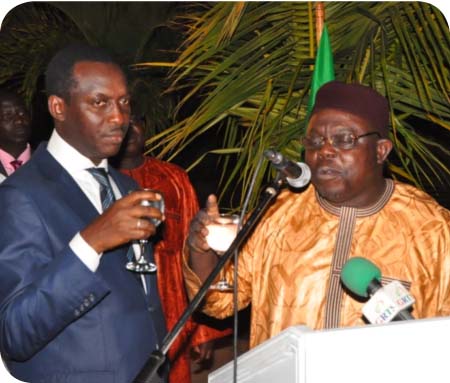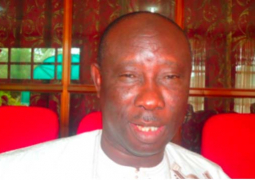
Gambia’s top diplomat was speaking on Friday evening at the Jardin de l’Oasis Apartment premises in Kololi, this year’s venue for a reception to mark the 54th anniversary of the independence of Senegal from French colonial rule.
Dr. Senghore spoke after Babacar Diagne, Senegal’s high commissioner to The Gambia, who in his statement had asked: “Where are we heading to?” after 50 years of independence in Africa, and “what should be the perspectives?”
Dr. Senghor said he fully agreed with ambassador Diagne, in asking about the way forward, and what we do now.
He recalled what he said to a group of Senegalese students from the University of Cheikh Anta Diop, who came to the University of The Gambia last year, when he was dean of the law faculty.
He told them that, “the beauty about us is that what separates us is alien to us. That’s the beauty about it; that we share everything together; we share everything in common.”
He went on to quote from a Cameroonian professor, who wrote about the Senegal-Gambia relationship, and stated that, “nowhere in Africa is union more easily achievable and realistically achievable than between Senegal and The Gambia.”
These were the words of a non-Senegambian, somebody who felt the unnecessary division of a people who share everything together, Dr. Senghor pointed out.
This Cameroonian intellectual did his analyses, and came to that conclusion, according to Dr. Senghor. “Then the problem is - what is wrong with us?” Another aspect to this relationship, he continued, is that it is handled by the people themselves. Whereas at the level of our governments, the relationship could be handled well or mishandled, he further noted, the people have to take matters into their own hands.
Dr. Senghor noted that religion is one of the most important elements of the life of Senegambians, and that at the religious level people are moving.
“The ECOWAS protocols on free movements of persons, goods and services across frontiers are being enforced by the people themselves. Then a little commitment from us, as governments, would make our relationship more easy, and it would quickly drive us to the reunion of a people, who in their past history shared everything together.” “For us here in The Gambia,” the Gambian foreign minister continued, “it has always been a fundamental pillar of our foreign policy, particularly towards Senegal and particularly under President Jammeh; that we always treat Senegalese and Gambians the same, and give them the same opportunity.
“Also, it has never happened; Gambia has never initiated, and would never initiate, particularly under President Jammeh, any negative gesture or move towards Senegal.
“This has always been a fundament pillar of our foreign policy; that we always treat Senegalese as part of us; we handle our relationship carefully, and are always sensitive to our relationship.
“This has always been a fundamental pillar in our foreign relations, and I’m sure President Jammeh would continue to enforce this very important aspect of our foreign policy.” Dr. Senghor added.
In answer to the questions raised by Senegal’s envoy to the Gambia, Dr. Senghore told the gathering that the answer is very simple.
“Let’s come back to the way we used to be, before the advent of colonial rule…Then what separates us would automatically and naturally disappear, and we’ll come back to be the same people who have and share everything together, and will forge together as one people and one nation.”
He congratulated Senegambians on this day, and prayed that “the good intention of our leaders, that is, to bring our people together and keep them together forever,” will become a reality.
Babacarr Diagne’s address
As mentioned above, Senegal’s top diplomat in Banjul did ask, in his address at the reception: “where are we heading to?” after 50 years of independence in Africa, and “what should be the perspectives?”
Declaring that a celebration of this kind is also a moment of reflection, ambassador Diagne said, “let’s ask ourselves this fundamental question: after fifty years of independence all over Africa, where are we heading to? And what should be the perspectives?”
“We must confess that despite all the efforts, a large majority of African countries still suffer heavily from the common known problems: long term decline in per capita incomes; rapid growth of populations; low levels of investment and domestic savings; not enough focus on agriculture, ecological degradation; slow progress in social development; and overextension of governments”.
West Africa, where we are, like the rest of the continent is caught in the squeeze of low commodity export prices, high import costs, burgeoning debt, lack of industries and, of course, as a consequence, huge unemployment. Despite all the efforts!
He went on: “Our view is that the sub region must be analysed as a whole. The vulnerability of the region as a whole can be seen in the transportation network, and the traditional patterns of trade.
“In my view this global situation can and must be addressed with a total integrated response. An appropriate integrated response must include debt relief, access to markets, new opportunities for trade, as well as emergency security assistance.
Commenting the bilateral relationship, Diagne noted that ‘due to our specific economic, social and historic framework, Senegal and The Gambia could play together a major role in that, with increased inter-governmental cooperation; in macro-economic policy, and security cooperation between the two states and beyond, with Guinea Bissau, Mauritania and Mali.
According to Diagne, “the sub regional transport network, trade and labour patterns, transnational investment linkages and supply systems all have significant historical roots”.
Mr Njie Baldeh covered the event for The Point


